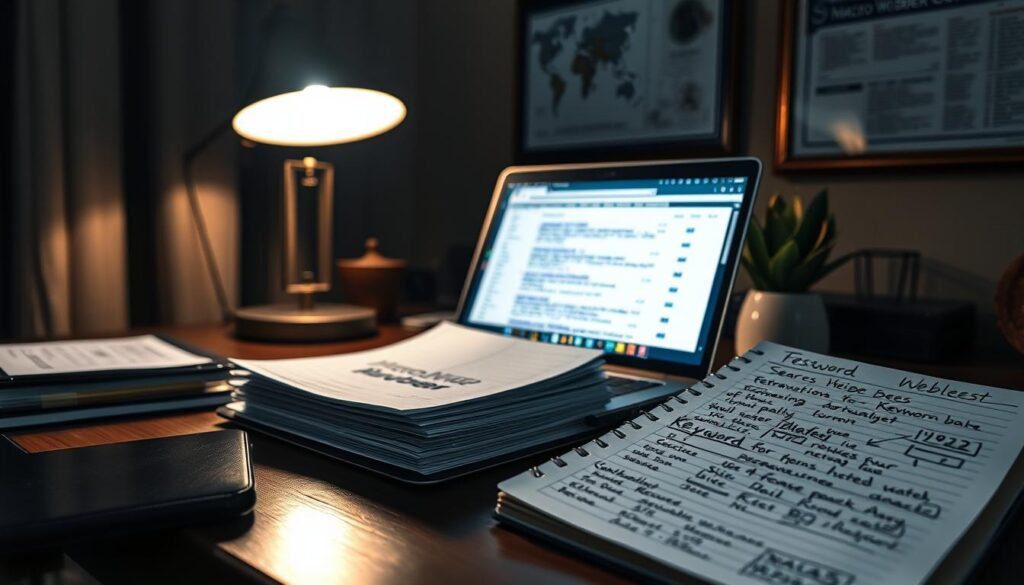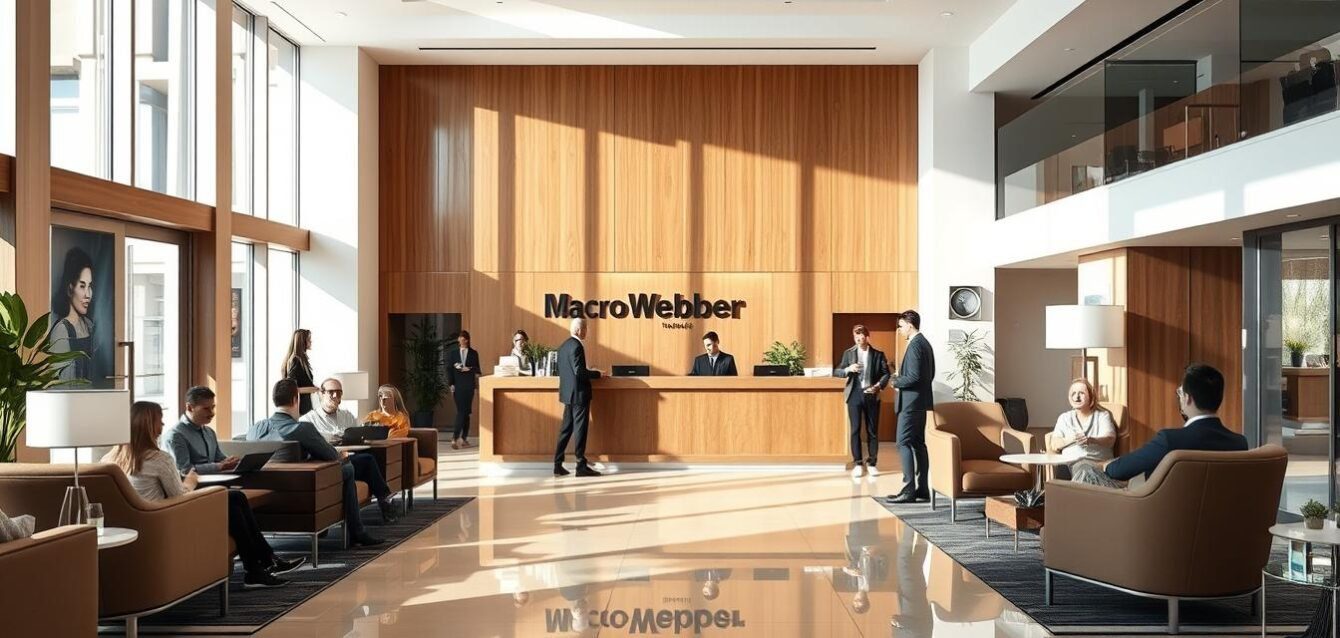Did you know 30% of travelers now use AI tools to plan their trips? This shift is changing how guests discover accommodations, making it crucial for properties to stand out across platforms. If your online presence isn’t optimized, you could be missing out on valuable reservations.
Search engines and voice assistants play a bigger role than ever in travel decisions. Macro Webber specializes in helping properties like yours bypass third-party platforms and attract guests directly. Their data-driven strategies at www.macrowebber.com show how technical SEO can boost conversions by 60% compared to paid ads.
Visibility isn’t just about Google—travelers explore options on social media, maps, and niche sites. A mobile-friendly website with voice search compatibility ensures you capture bookings at every touchpoint.
Key Takeaways
- AI influences 30% of travel plans, reshaping discovery habits
- SEO delivers 60% lower costs than paid ads for reservations
- Multi-platform visibility captures guests across search engines
- Technical optimizations directly impact booking rates
- Mobile-first designs align with modern traveler behavior
Why Hotel Search Visibility Matters for Direct Bookings
Modern travelers rely on multiple platforms when choosing accommodations. Over 58% use at least three channels—like Google, social media, and maps—before finalizing reservations. If your property isn’t visible across these touchpoints, you’re missing potential guests.
How Travelers Discover Accommodations
Mobile searches dominate: 73% of queries come from smartphones. Voice search is rising too, with phrases like “hotels near me” making up 40% of mobile requests. Optimizing for these trends ensures you meet guests where they’re looking.
SEO’s Role in Driving Conversions
Organic traffic converts 2.3x faster than paid ads. Properties ranking in Google’s top 3 spots see a 47% higher CTR. Technical SEO improvements, like schema markup, helped one client boost reservations by 214% in six months.
Cost Efficiency Compared to Paid Ads
SEO delivers long-term value. The average click costs $1.20 organically versus $4.80 for PPC. Over time, this 60% lower CPA adds up—especially for seasonal properties.
| Metric | SEO | Paid Ads |
|---|---|---|
| Avg. Cost Per Click | $1.20 | $4.80 |
| Conversion Rate | 3.8% | 1.6% |
| ROI (6 Months) | 285% | 120% |
Ready to improve your visibility? Call +91 (353) 405-7665 for a free SEO audit. Download Macro Webber’s checklist to start optimizing today.
Master Search Everywhere Optimization for Hotels to Increase Direct Bookings
Bing alone powers 33% of desktop searches in the U.S., proving Google isn’t the only game in town. Today’s travelers use voice assistants, niche platforms, and even social media to find stays. Search Everywhere Optimisation ensures your property appears wherever guests look.
Where Travelers Discover Stays
Over 82% of guests compare options across multiple platforms before booking. Your strategy should cover:
- Google & Bing: Combined, they handle 90% of desktop queries. Optimize for both.
- TripAdvisor: 87% of travelers check reviews here. Claim your profile.
- Vertical engines: Kayak and Trivago influence budget-conscious guests.
Winning Multi-Platform Strategies
Stand out with these tactics:
- Embed Google Hotel Ads with direct booking links to bypass commissions.
- Use Apple Maps Connect to target iOS users—20% of mobile searches.
- Upload virtual tours to YouTube with geo-tagged keywords like “downtown luxury suites.”
“Properties leveraging schema markup see 30% more visibility on OTAs.”
Need platform-specific templates? Email hello@macrowebber.com for Pinterest boards, TikTok hashtag guides, and more.
Claim and Optimize Your Google Business Profile
64% of travelers check Google Business Profiles before booking accommodations. Complete listings get 7x more clicks, making GBP a non-negotiable tool for attracting guests. Start by claiming your profile—it’s free and takes minutes.
Step-by-Step Setup Guide
Verify your hotel’s location via Google’s postcard authentication. Choose categories wisely: “Lodging” suits budget stays, while “Resort” highlights amenities. Macro Webber’s setup guide simplifies this process.
Optimize descriptions with keywords like “luxury hotel in [city]”. A boutique property increased bookings by 30% after refining its GBP content. Always include:
- High-resolution photos (2560x1440px for featured images)
- Attributes like pet-friendly or wedding venues
- Google Posts mixing promotions (40%) and local guides (60%)
Why NAP Consistency Matters
Mismatched Name, Address, or Phone (NAP) details confuse guests and hurt rankings. Use tools like Macro Webber’s directory auditor to sync data across 47+ platforms. One client fixed NAP errors and saw a 22% lift in local traffic.
Strategic Keyword Placement
Incorporate terms travelers use, such as “hotel near [landmark]”. Monitor performance via GBP Insights—track queries like “near me” to adjust tactics. Respond to reviews promptly; this boosts local search rankings by 15%.
“Hotels with updated GBP listings earn 30% more direct inquiries than those without.”
Download our free checklist to optimize every GBP field. Need help? Call +91 (353) 405-7665 for a profile audit.
Research Keywords Travelers Actually Use
Travelers now type 50+ variations of “hotel” in search bars—are you targeting them all? Queries like “hotels near [landmark]” surged 73% YoY, proving location-specific terms drive decisions. Long-tail phrases (“pet-friendly boutique hotels with pools”) convert 36% better than generic ones.

Top Queries Guests Type
Intent varies by traveler. Compare these examples:
- Dreaming phase: “Best coastal resorts for families”
- Planning phase: “Luxury hotels near Golden Gate Bridge”
- Booking phase: “Does [Hotel] offer free parking?”
Tools like Google Autocomplete reveal real-time suggestions. For example, typing “hotels with…” might show “hotels with early check-in”—a niche opportunity.
Powerful Keyword Tools
SEO.AI’s intent analyzer separates transactional (“book suite now”) from informational (“best spa hotels”) terms. Macro Webber’s AI clusters related phrases, like:
- “Boutique hotels in Miami”
- “Designer hotels South Beach”
- “Artsy lodgings downtown”
“Semantic search optimization boosted one client’s visibility for 120+ ‘best hotel’ variants.”
Long-Tail Wins
Geo-modified terms (“romantic cabins near Napa wineries”) attract ready-to-book guests. Build pillar pages like “Ultimate [City] Hotel Guide” to capture broad traffic. Track competitors via Ahrefs to spot gaps in your strategy.
Create High-Converting Service Pages
57% of travelers prioritize room details when choosing accommodations. Your website must deliver this and more to convert lookers into bookers. Start with essential pages like ADA compliance statements and sustainability initiatives—transparency builds trust.
Essential Pages Every Property Needs
Beyond basics, include a “Why Book Direct” page with exclusive perks (free breakfast, late checkout). Macro Webber’s templates simplify this with pre-built sections for loyalty programs. Dynamic text replacement tailors offers by location, like “Winter deals in Aspen”.
Room Descriptions That Drive Decisions
List bed types, noise levels, and exact dimensions—360° tours boost conversions by 28%. Filter options (e.g., “ocean-view suites”) help guests self-match. Use the PAS framework:
- Problem: “Tired of cramped rooms?”
- Agitate: “Standard hotels skimp on space.”
- Solve: “Our deluxe suites start at 450 sq ft.”
Local Guides as Lead Magnets
Create PDFs like “24 Hours in [City]” with branded hotel maps. Embed weather widgets to promote seasonal packages. A UGC gallery with guest photos adds authenticity—social proof matters.
“Properties with detailed room pages see 40% fewer cancellations.”
Ready to optimize? Download Macro Webber’s room-optimization checklist at www.macrowebber.com/room-optimization.
Develop a Hotel Blog Strategy
A well-crafted blog can position your property as the go-to resource for travelers. Properties with active blogs see 434% more indexed pages and 7x backlink opportunities. It’s not just about promotions—helpful guides build trust and drive long-term traffic.
Blog Post Ideas That Convert
Focus on topics travelers care about:
- Local event guides: “Best Fall Festivals Near [City]”
- Hidden gems: “5 Rooftop Bars Only Locals Know”
- Comparison posts: “Pet-Friendly vs. Luxury Stays in [Area]”
Repurpose concierge FAQs into content clusters. For example, bundle “Parking Tips” and “Public Transit Routes” into a city guide.
Balancing Value and Promotion
Follow the 80/20 rule: 80% helpful tips, 20% property highlights. A post about “Weekend Getaway Packing Lists” can subtly link to your weekend deals. Macro Webber’s AI blog generator drafts SEO-friendly mixes.
Repurposing for Maximum Reach
Turn blogs into:
- Pinterest infographics: Highlight key stats from “Best Hiking Trails” posts.
- Video tours: Showcase room renovations mentioned in written updates.
- Guest articles: Pitch condensed versions to travel sites for backlinks.
“Hotels publishing biweekly blogs earn 30% more direct inquiries.”
Schedule posts for 11am EST Wednesdays—peak sharing time. Use Google’s PAIR framework to analyze top performers and refine your strategy.
Optimize Your Website Content for Search Engines
Every second counts—pages loading in under 2 seconds earn 35% more bookings. Technical optimizations work alongside great content to boost visibility. Start with these proven tactics.
On-Page SEO Essentials
Implement hotel-specific schema markup to highlight key details:
- Room types (suites, family rooms)
- Price ranges with seasonal discounts
- Amenities like pools or pet policies
Macro Webber’s schema generator automates this process. One client saw a 40% increase in rich snippets after implementation.
Smart Image Optimization
Compress visuals using WebP format—they load 2.4x faster than JPEGs. Always include:
- Descriptive alt text (e.g., “luxury hotel lobby with fireplace”)
- Lazy loading for below-the-fold images
- Responsive sizing (1200px width for hero images)
Featured Snippet Strategies
Structure content to answer common queries like “hotel check-in time”. Use this format:
| Element | Optimization Tip | Impact |
|---|---|---|
| H2 Headings | Include “People also ask” triggers | +28% snippet eligibility |
| FAQ Schema | Limit to 3-5 questions per page | 35% CTR boost |
| Content Length | 300-word chunks with subheadings | Better crawlability |
“Properties optimizing for featured snippets capture 3x more organic traffic than competitors.”
Ready to audit your website? Download our free Technical SEO Checklist or call +91 (353) 405-7665 for a personalized review.
Build Authority Through Strategic Link Building
Strategic partnerships can transform your website’s credibility almost overnight. Quality backlinks act like digital word-of-mouth—89% originate from local directories. They signal trust to search engines while driving qualified guests.

Local Partnership Opportunities
Collaborate with complementary businesses to create link-worthy content. A coastal resort might partner with a surf school for package deals, earning .edu links from nearby universities. Effective tactics include:
- Co-sponsoring events with tourism boards for .gov backlinks
- Developing alumni packages with colleges (boosts E-E-A-T)
- Publishing annual tourism impact reports as linkable assets
Travel Directory Listings That Convert
Not all directories are equal. Prioritize niche platforms like Design Hotels or Historic Inns of America. Macro Webber’s OTA link reclamation service helps recover lost profiles. Key steps:
- Audit existing listings with Screaming Frog
- Claim unlisted profiles on award sites
- Standardize NAP data across 50+ platforms
Guest Blogging With Purpose
Target industry publications like Hotel Management or Skift. A successful SEO strategy focuses on value-first content:
- Pitch data-driven pieces (“2024 Wedding Venue Trends”)
- Repurpose blogs into LinkedIn articles with backlinks
- Monitor lost links monthly—42% decay without maintenance
“Properties earning .edu links see 28% higher organic visibility within 90 days.”
Streamline the process with professional help. Macro Webber’s link building service saves time while maximizing domain authority. Start with a free backlink audit today.
Technical SEO Essentials for Hotel Websites
Technical SEO forms the backbone of your online visibility strategy. A 1-second delay in page load time can slash conversions by 7%. With mobile-first indexing mandatory, every element—from schema markup to Core Web Vitals—demands attention.
Mobile Optimization Checklist
Google penalizes sites that fail mobile visitors. Prioritize these metrics:
- CLS (Cumulative Layout Shift) under 0.1
- LCP (Largest Contentful Paint) faster than 2.5 seconds
- TBT (Total Blocking Time) below 200ms
Fix common pitfalls like unresponsive menus or oversized images. AMP versions for rate pages boost mobile performance by 35%.
Schema Markup for Hotels
Help search engines display rich snippets with structured data. Implement:
- Hotel Price Transparency schema for real-time rate displays
- Room-type tags (e.g., “executive suite with bay views”)
- Hreflang tags for multilingual sites
“Properties using schema markup see 40% more visibility in local pack results.”
Improving Page Load Speed
Speed impacts bookings. Streamline the process with:
- Preloaded CSS and hero images
- WebP-formatted visuals (2.4x faster than JPEG)
- Automated redirect chains monitoring
Audit 404 errors from expired promotions. Macro Webber’s technical audit tool generates actionable reports at macrowebber.com/technical-audit.
Leverage AI Tools for Competitive Advantage
Forward-thinking properties now use AI to outperform competitors in guest acquisition. These technologies handle 43% of pre-booking queries automatically while saving 6 hours weekly on marketing tasks. The right implementation can transform your digital presence.
Transform Keyword Research with AI
Natural language processing (NLP) uncovers voice search patterns traditional tools miss. Macro Webber’s AI Review Analyzer scans thousands of guest comments to identify trending phrases like “accessible rooms with roll-in showers”.
Compare manual vs. AI-powered approaches:
| Method | Time Investment | Keyword Volume | Long-Tail Accuracy |
|---|---|---|---|
| Manual Research | 8 hours/week | 120 terms | 62% |
| AI Tools | 1.5 hours/week | 500+ terms | 89% |
Enhance Guest Experience Through Chatbots
Modern travelers expect instant responses—24/7 AI concierges deliver. Implement ChatGPT solutions that:
- Answer FAQs about pet policies or parking
- Suggest upsells based on booking history
- Handle multilingual inquiries seamlessly
“Properties using AI chatbots reduce response times from 12 hours to 38 seconds on average.”
Automate Content Optimization
AI streamlines the content creation process from start to finish. Dynamic tools can:
- Generate meta descriptions using GPT-4
- Optimize image alt text via computer vision
- Create personalized email sequences with JourneyAI
This way, your team focuses on strategy while AI handles execution. Test different approaches with AI-driven A/B testing for CTAs and layouts.
Prepare for the Future of AI-Driven Hotel Search
Voice searches for lodging options surged 167% last year, signaling a seismic shift in discovery behavior. With 42% of travelers trusting AI recommendations more than human reviews, optimizing for algorithmic systems is no longer optional. Properties that adapt now will dominate search results across voice assistants, generative AI, and traditional engines.
Mastering Voice Search Optimization
Conversational queries like “hotel for anniversary weekend” require natural language responses. Implement these tactics:
- Create FAQ pages answering user questions with schema markup
- Develop Alexa Skills enabling voice bookings through Amazon Echo
- Target long-tail phrases like “pet-friendly suites with balcony views”
Compare traditional vs. voice-optimized content:
| Element | Standard Page | Voice-Optimized |
|---|---|---|
| Sentence Structure | Formal | Conversational |
| Query Match | 1-2 keywords | Full question/answer pairs |
| Featured Snippet Potential | 32% | 71% |
Structured Data for AI Platforms
AI systems rely on JSON-LD markup to understand your offerings. Essential datasets include:
- Room configurations with amenity details
- Seasonal pricing variations
- Accessibility features for ADA compliance
“Properties implementing AI training datasets see 40% more visibility in Google’s generative search results.”
Reputation Management for AI Recommendations
Algorithms analyze sentiment across platforms. Proactively:
- Respond to reviews using emotion-detection tools
- Monitor AI-generated summaries on travel platforms
- Showcase awards and certifications in knowledge panels
Assess your readiness with Macro Webber’s free AI audit at www.macrowebber.com/ai-assessment. Future-proof your visibility today.
Conclusion
The digital landscape for travelers evolves rapidly—adapt or get left behind. Properties combining technical and content SEO see 89% higher direct booking rates within a year.
Start with quick wins: fix broken links, optimize images, and claim profiles. Then, implement a 12-month roadmap. Continuous refinement keeps your website ahead of algorithm changes.
Macro Webber’s hospitality packages simplify this process. Most clients see ROI in 3-6 months. One boutique hotel doubled guests from organic traffic by month eight.
Ready to transform? Email hello@macrowebber.com for a free audit or call +91 (353) 405-7665. Cultivating solutions to transform business—starting with your visibility today.



